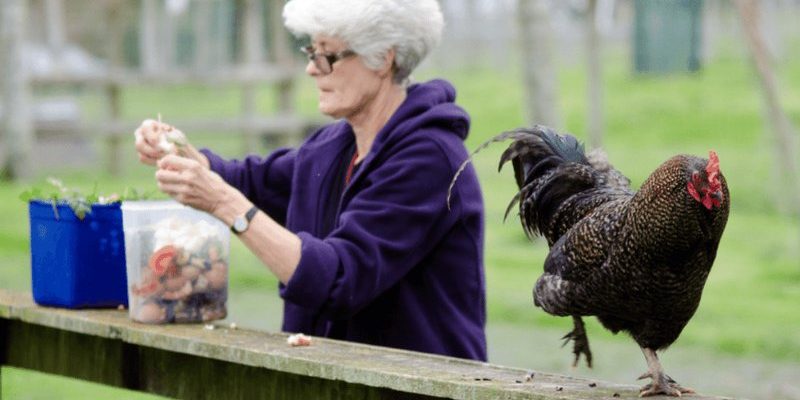
Imagine you’re on a nature walk with a Leghorn. As you stroll, you notice it scratching the ground and darting around. It’s not just being playful; it’s on a mission to find a snack. Leghorns are savvy foragers, and their diet is as varied as their personalities. Let’s explore what these spirited birds eat and how they hunt and forage for their meals.
Understanding the Leghorn’s Natural Diet
Leghorns are omnivores, meaning they enjoy a mix of plant and animal foods. In the wild, their diet consists primarily of:
- Seeds and grains: These birds love munching on seeds and grains, which provide essential nutrients.
- Insects: You’ll often see them scratching around for insects like worms, beetles, and grasshoppers.
- Greens: Fresh greens are a delightful addition to their meals, offering vitamins and minerals.
- Fruits: Apples, berries, and other fruits are tasty treats that they’ll enjoy when available.
This diverse diet helps keep Leghorns healthy and vibrant. It’s like having a balanced meal plan that keeps them energetic and ready for their daily adventures. If you ever find yourself wondering how to ensure your Leghorns stay happy and well-fed, just remember to include a variety of these foods in their feeding regimen.
Foraging Behavior of Leghorns
Leghorns are built for foraging. Their sharp beaks and quick movements make them adept at hunting for food. They’re like little detectives, always on the lookout for their next meal. Here’s how they typically forage:
1. Scratching the Ground: Leghorns have a natural instinct to scratch the earth with their feet, which helps uncover hidden treats like insects and seeds.
2. Pecking: Their beaks are perfectly designed for pecking at the ground or plants, allowing them to grab small morsels of food quickly.
3. Exploring: These birds are curious by nature. You might notice them wandering around, checking out different areas for fresh food.
Foraging is not just about finding food; it’s also crucial for their physical and mental well-being. When they can hunt for their meals, they’re less likely to experience boredom and stress. You might be wondering why this matters—it’s all part of keeping them healthy and happy, which ultimately leads to better egg production and a thriving flock!
Feeding Leghorns in Captivity
If you’re raising Leghorns at home, you might be thinking about how to provide a proper diet. While they do love to forage, their diet needs some careful planning to ensure they’re getting everything they need. Here’s what you should consider:
– Commercial Feed: A high-quality layer feed will provide the essential nutrients they need to lay eggs. Look for feeds that are specifically formulated for laying hens.
– Free-Range Options: If possible, let them roam in a secure outdoor space. This allows them to forage naturally and helps diversify their diet.
– Supplemental Treats: Keep it interesting by offering treats like kitchen scraps (avoid anything toxic to chickens) or fruits and veggies. Just be sure to do this in moderation.
Feeding Leghorns properly can enhance their overall health and even improve the quality of their eggs. Think of it like giving them a gourmet meal instead of fast food; it makes all the difference!
Common Foraging Challenges and Solutions
While Leghorns are savvy foragers, they can face challenges, especially when it comes to finding food. Here are some common obstacles and how to tackle them:
– Limited Space: If you’re keeping them in a small coop, they might not have enough room to forage. Consider expanding their area to encourage natural behaviors.
– Competition: If you have multiple birds, they might compete for food. Ensure there’s enough food and space for everyone to feel safe and satisfied.
– Seasonal Changes: In winter or harsh weather, food sources can be scarce. During these times, it’s essential to provide adequate feed and less reliance on foraging.
Here’s the thing—understanding these challenges can help you provide a more enriching environment for your Leghorns. It’s all about creating a balance between their natural instincts and the practicalities of backyard farming.
The Importance of a Balanced Diet
A balanced diet is crucial not just for Leghorns but for all chickens. Poor nutrition can lead to health problems, which may hinder their egg production or overall vitality. Here’s why a balanced diet matters:
– Health: A varied diet boosts their immune systems and helps them fend off diseases. Think of it as building their defense system.
– Egg Quality: Proper nutrition leads to better egg quality—stronger shells and more vibrant yolks. Who doesn’t want fresh, delicious eggs?
– Behavioral Health: Chickens fed a balanced diet tend to exhibit less aggressive behavior, leading to a more harmonious flock.
By prioritizing nutrition, you’re investing in the long-term health and happiness of your Leghorns. Just like you wouldn’t thrive on a junk food diet, they need wholesome foods to flourish.
Caring for Leghorn chickens involves more than just feeding them; it’s about understanding their needs and instincts. Their diets are diverse, relying on their natural foraging behaviors to keep them healthy and happy. Whether they’re scratching the ground for insects or pecking at seeds, they embody the spirit of resourcefulness.
By providing them with a balanced diet and the opportunity to forage, you ensure that your Leghorns thrive. It’s like giving them a little piece of their wild ancestry while still enjoying the comforts of home. So, get ready to watch your Leghorns flourish, knowing you’re giving them the best care possible. You might just end up with a beautiful flock that brings joy and plenty of fresh eggs to your table!

